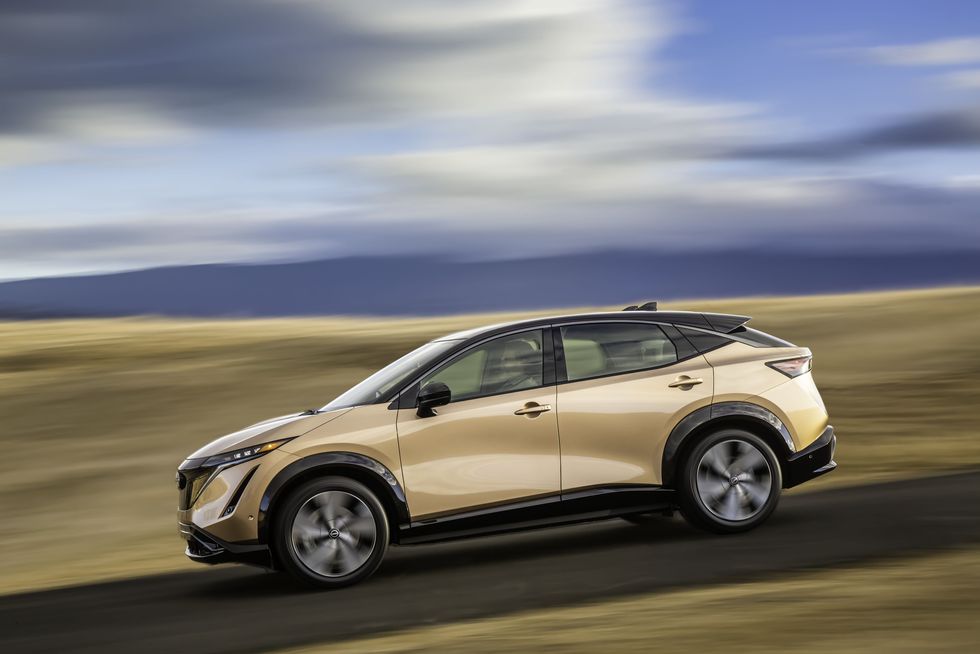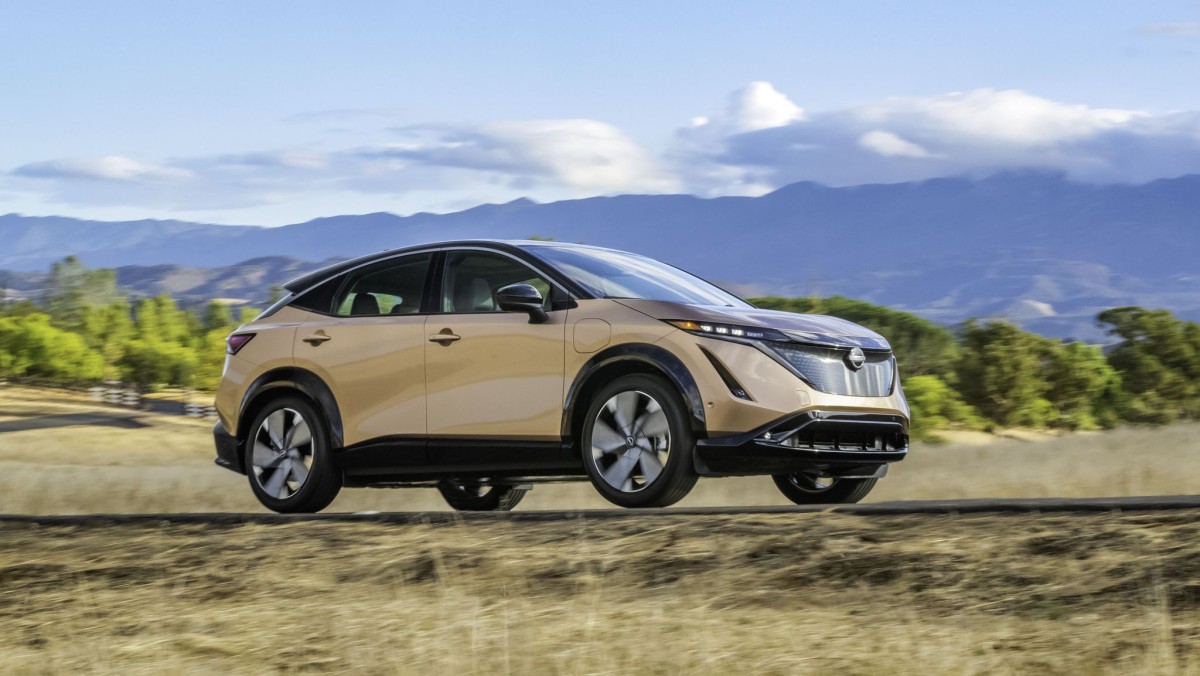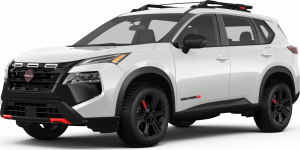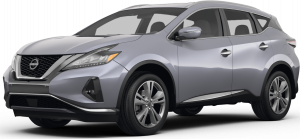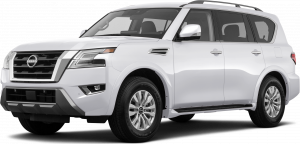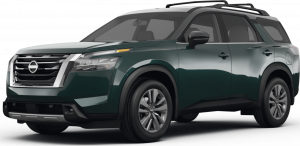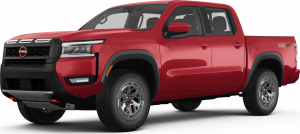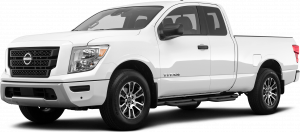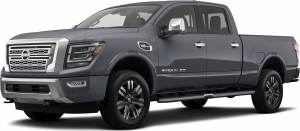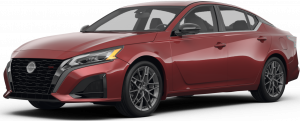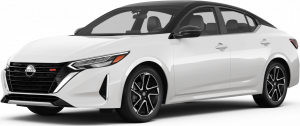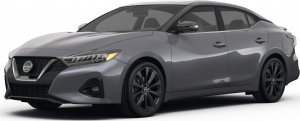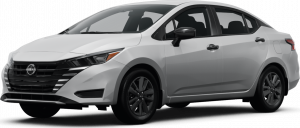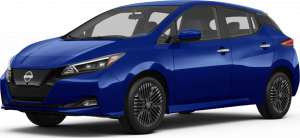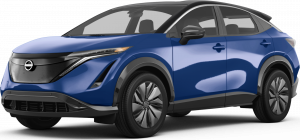Overview
Nissan is expanding its line of electric vehicles with the 2023 Ariya SUV, which will go on sale in the U.S. in fall 2022. The Ariya will join the Leaf hatchback in the Nissan showroom and will offer up to 300 miles of driving range, which beats the Leaf's maximum of 226. The Ariya's design represents a shift from the current sharp, angular lines seen on many of Nissan's vehicles. The low, wide stance of the Ariya differentiates it from the Rogue and gives it a sportier look. Two different battery sizes will be offered—a 63.0-kWh battery is standard, and a larger 87.0-kWh pack is optional—as well as either front- or all-wheel drive. A host of driver-assistance features, infotainment tech, and convenience items will be included here, helping the 2022 Ariya compete with similarly sized EV crossovers, such as the Tesla Model Y and Hyundai Kona Electric.
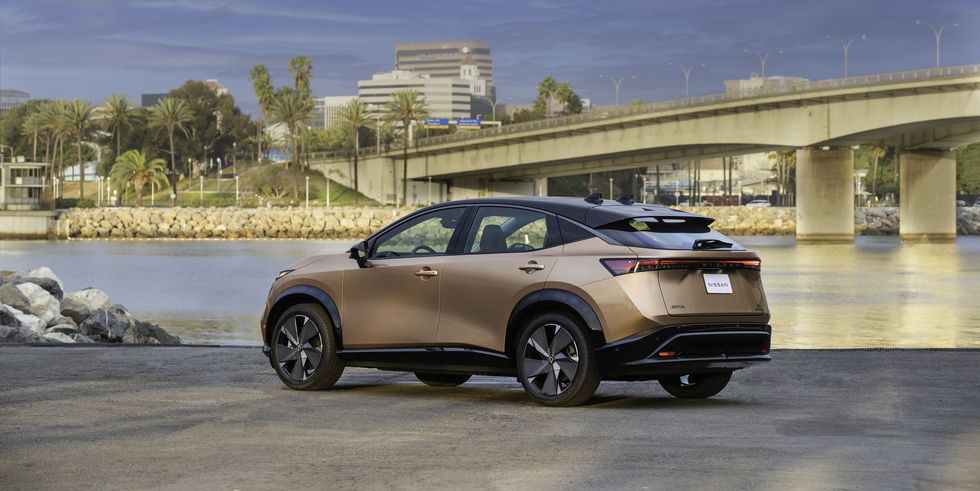
What's New for 2023?
The Ariya is an all-new vehicle for Nissan. It features Nissan's new semi-autonomous driving system (ProPilot 2.0), which debuted on the Japanese-market Nissan Skyline sedan. The Ariya is said to deliver up to 300 miles of driving range, but only when equipped with the optional dual-front/rear-motor drive configuration and the larger 87.0-kWh battery pack.
Pricing and Which One to Buy
The Ariya's $47,125 starting price puts it above the Leaf and other affordable EVs but under the base price of the Model Y. We're of the mindset that to successfully switch from gasoline to electricity, range is key, so we'd stick with the entry-level Venture+ trim which boasts the longest driving range among the Ariya's four trim levels.
EV Motor, Power, and Performance
Unlike the Leaf, which comes only with front-wheel drive, Nissan is pulling from features developed in other cars, including the GT-R sports car's torque-split system, to offer optional all-wheel drive via a dual-front/rear-electric-motor configuration. Front-wheel drive models offer a claimed zero-to-60-mph time of 7.2 seconds according to Nissan, so if you're looking for more pep, consider the more powerful all-wheel drive Ariya which is significantly faster. We estimate that model will zip from zero to 60 mph in less than 5.0 seconds, a feat that is similar to higher-end electric vehicles. From what we've experienced so far, the Ariya provides a calm, stable ride which should please most buyers, but it lacks the sporty nature we driving enthusiasts prefer. When we get a chance to test the Ariya for ourselves and evaluate its handling in the real world, we'll update this story with details.
Range, Charging, and Battery Life
Nissan says the Venture+ offers up to 300 miles of driving range per charge, which is quite the step up from the Leaf's maximum range of 226 miles. The Evolve+ and Premiere models offer up to 285 miles per charge and the top-spec Platinum+ is supposedly good for up to 265. Similarly sized vehicles include Jaguar's I-Pace and Audi's E-Tron, which have 234 and 204 miles of range, respectively. Key rivals from Tesla offer claimed ranges of over 300 miles. The Ariya will be capable of charging at home on 110- or 240-volt outlets as well as at public charging stations and even DC fast-charging ports.
Fuel Economy and Real-World MPGe
EPA fuel economy estimates aren’t yet available for the Ariya, nor has Nissan released any claimed MPGe figures. When the Ariya gets closer to launch, that information will likely be available. We also hope to test the Ariya ourselves on our 200-mile highway route, which allows us to evaluate its real-world efficiency. For more information about the Ariya's fuel economy, visit the EPA's website.
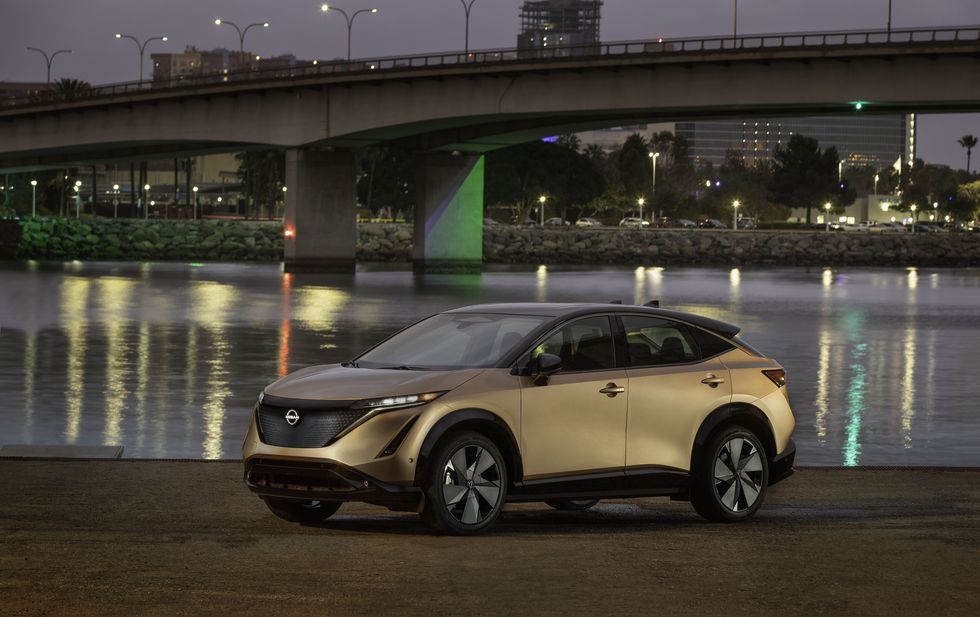
Interior, Comfort, and Cargo
The Ariya's interior looks futuristic and minimal. Nissan has discarded every button possible in pursuit of a smooth dashboard that favors a sleek look to match the design of the exterior. Despite Nissan's claim that the Ariya's cabin is unlike a traditional automotive interior, its minimalistic theme appears to be its sole unique trait. Not that the cabin doesn't look like a nice place to spend time. A flat, low floor creates a spacious feeling inside, and Nissan has incorporated its comfy zero-gravity seats into the design. The rear seat space is noticeably less generous than the front, but a pair of adults should still find it comfortable and roomy enough even for long-distance travel.
Infotainment and Connectivity
Dual 12.3-inch displays serve as both the digital gauge cluster and the infotainment screen. Apple CarPlay, Android Auto, and in-dash navigation should all be standard features. The Ariya concept that was shown in 2019 had a feature that allowed the car to sync with the schedule of the driver, so it can pre-heat or pre-cool the interior while it's parked and charging, and therefore not draw on the power from the battery. The concept also showed off technology that would allow the driver to use their phone to park the Ariya automatically from a nearby location using ProPilot's Remote Park, a system similar to Tesla's Smart Summon feature. Nissan hasn't said yet if these features will make it to the production model.
Safety and Driver-Assistance Features
The Ariya will feature ProPilot 2.0, Nissan's second generation of the ProPilot semi-autonomous technology, as an optional feature. The system allows drivers to remove their hands from the wheel in certain driving scenarios. Although we haven't tested this new setup, we liked the original ProPilot system when we used it in 2017—and if that's any indication of how version 2.0 will perform, our expectations are high. For more information about the Ariya's crash-test results, visit the National Highway Traffic Safety Administration (NHTSA) and Insurance Institute for Highway Safety (IIHS) websites. Key safety features include:
- Standard automated emergency braking with pedestrian detection
- Standard lane-departure warning with lane-keeping assist
- Available adaptive cruise control with semi-autonomous driving mode
Warranty and Maintenance Coverage
We predict the Ariya will come with the same basic warranty package as the Leaf when it goes on sale. That warranty should include a competitive bumper-to-bumper policy as well as battery protection that stretches over eight years or 100,000 miles.
- Limited warranty covers three years or 36,000 miles
- Powertrain warranty covers five years or 60,000 miles
- Battery warranty covers eight years or 100,000 miles
- No complimentary scheduled maintenance
